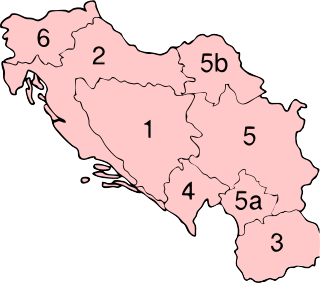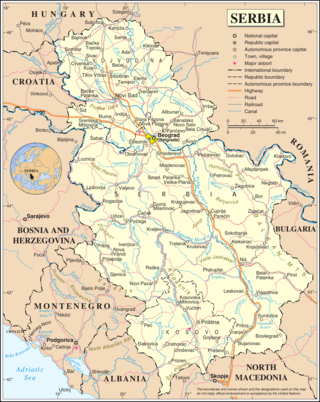
United Nations Security Council resolution 815, adopted unanimously on 30 March 1993, after reaffirming Resolution 743 (1992) and all subsequent relevant resolutions concerning the United Nations Protection Force (UNPROFOR) including 802 (1993) and 807 (1993), the council, acting under Chapter VII of the United Nations Charter, extended UNPROFOR's mandate for an additional interim period ending 30 June 1993.

United Nations Security Council resolution 843, adopted unanimously on 18 June 1993, after reaffirming Resolution 724 (1991) and Article 50 of the United Nations Charter, the council was conscious of the fact that an increasing number of requests for assistance have been received under Article 50.

United Nations Security Council resolution 847, adopted unanimously on 30 June 1993, after reaffirming Resolution 743 (1992) and subsequent resolutions relating to the United Nations Protection Force (UNPROFOR), the council condemned military attacks in Croatia and Bosnia and Herzegovina and extended the mandate of UNPROFOR until 30 September 1993.

United Nations Security Council resolution 870, adopted unanimously on 1 October 1993, after reaffirming Resolution 743 (1992) and subsequent resolutions relating to the United Nations Protection Force (UNPROFOR), the council, acting under Chapter VII of the United Nations Charter, extended UNPROFOR's mandate for additional period terminating 5 October 1993.

United Nations Security Council resolution 871, adopted unanimously on 4 October 1993, after reaffirming resolutions 713 (1992) and 743 (1992) and subsequent resolutions relating to the situation in the former Yugoslavia and United Nations Protection Force (UNPROFOR), the Council expressed concern that United Nations peacekeeping plan for Croatia, in particular Resolution 769 (1992), had not been implemented and went on to discuss the peace plan and extend UNPROFOR's mandate until 31 March 1994.

United Nations Security Council resolution 947, adopted unanimously on 30 September 1994, after recalling all resolutions on the situation on the former Yugoslavia including Resolution 908 (1994), the Council discussed the situation in Croatia and extended the mandate of the United Nations Protection Force (UNPROFOR) until 31 March 1995.

United Nations Security Council resolution 958, adopted unanimously on 19 November 1994, after recalling all resolutions on the situation in the former Yugoslavia including Resolution 836 (1993), the council, acting under Chapter VII of the United Nations Charter, determined that the situation in the former Yugoslavia continued to constitute a threat to international peace and security and in its support of the United Nations Protection Force (UNPROFOR), authorised the use of air strikes in Croatia in addition to Bosnia and Herzegovina by member states, in order for UNPROFOR to carry out its mandate. UNPROFOR was authorised to use air force independently, via direct member states support or via regional organizations. Subsequent air force interventions in Udbina airfield and other locations in Croatia and Bosnia, were conducted with NATO support.
United Nations Security Council resolution 967, adopted unanimously on 14 December 1994, after recalling all resolutions on the situation in the former Yugoslavia, in particular Resolution 757 (1992) and receiving letters from the chairman of the security council committee established in Resolution 727 (1992) and the United Nations Children's Fund which noted a resurgence in diphtheria and that the only available stocks of anti-serum to combat the condition were located in Serbia and Montenegro, the council, acting under Chapter VII of the United Nations Charter, authorised the export of 12,000 vials of diphtheria anti-serum from the country for a period of 30 days.

United Nations Security Council resolution 970, adopted on 12 January 1995, after reaffirming all resolutions on the situation in Bosnia and Herzegovina in particular Resolution 943 (1994) concerning the border closure between the Federal Republic of Yugoslavia and Bosnia and Herzegovina, the Council decided that measures in that resolution would be suspended for a further period of 100 days.

United Nations Security Council resolution 981, adopted unanimously on 31 March 1995, after reaffirming all resolutions on the situation in the former Yugoslavia, the council established the United Nations Confidence Restoration Operation in Croatia (UNCRO) for a period terminating 30 November 1995.
United Nations Security Council resolution 982, adopted unanimously on 31 March 1995, after reaffirming all resolutions on the situation in the former Yugoslavia in particular Resolution 947 (1994) concerning the United Nations Protection Force (UNPROFOR), the Council extended the mandate of UNPROFOR for additional period terminating 30 November 1995 and discussed operations in Croatia.

United Nations Security Council resolution 990, adopted unanimously on 28 April 1995, after reaffirming all resolutions on the conflicts in the former Yugoslavia, particularly resolutions 981 (1995) and 982 (1995), the council, acting under Chapter VII of the United Nations Charter, authorised the deployment of the United Nations Confidence Restoration Operation in Croatia (UNCRO).

United Nations Security Council resolution 992, adopted unanimously on 11 May 1995, after reaffirming all resolutions on the situation in the former Yugoslavia, including 820 (1993), the Council addressed freedom of navigation in the Danube River.

United Nations Security Council resolution 994, adopted unanimously on 17 May 1995, after reaffirming all resolutions on the conflicts in the former Yugoslavia, particularly resolutions 981 (1995), 982 (1995) and 990 (1995), the Council discussed the withdrawal of Croatian Army from the zone of separation taken in Operation Flash on May 1st and the full deployment of the United Nations Confidence Restoration Operation in Croatia (UNCRO).

United Nations Security Council resolution 1003, adopted on 5 July 1995, after reaffirming all resolutions on the situation in the former Yugoslavia, in particular resolutions 943 (1994), 970 (1995) and 988 (1995), the Council noted measures by the Federal Republic of Yugoslavia to continue the border closure with Bosnia and Herzegovina and therefore extended the partial suspension of sanctions against Serbia and Montenegro for an additional 75 days until 18 September 1995.

United Nations Security Council resolution 1015, adopted unanimously on 15 September 1995, after reaffirming all resolutions on the situation in the former Yugoslavia, in particular resolutions 943 (1994), 970 (1995), 988 (1995) and 1003 (1995), the Council noted measures by the Federal Republic of Yugoslavia to continue the border closure with Bosnia and Herzegovina and therefore extended the partial suspension of sanctions against Serbia and Montenegro for an additional 180 days until 18 March 1996.

United Nations Security Council resolution 1022, adopted on 22 November 1995, after recalling all resolutions on the conflicts in the former Yugoslavia, the Council suspended measures in previous resolutions related to the former Yugoslavia.

United Nations Security Council resolution 1031, adopted unanimously on 15 December 1995, after recalling all previous resolutions on the conflicts in the former Yugoslavia, the council, acting under Chapter VII of the United Nations Charter, discussed the transfer of authority from the United Nations Protection Force (UNPROFOR) to the multinational Implementation Force (IFOR).

United Nations Security Council resolution 1047, adopted unanimously on 29 February 1996, after recalling resolutions 808 (1993), 827 (1993), 936 (1994) and 955 (1994), the Council appointed Louise Arbour as Prosecutor at the International Criminal Tribunal for Rwanda (ICTR) and the International Criminal Tribunal for the former Yugoslavia (ICTY).

United Nations Security Council resolution 1259, adopted unanimously on 11 August 1999, after recalling resolutions 808 (1993), 827 (1993), 936 (1994), 955 (1994) and 1047 (1996), the Council appointed Carla Del Ponte as Prosecutor at the International Criminal Tribunal for Rwanda (ICTR) and the International Criminal Tribunal for the former Yugoslavia (ICTY).

















